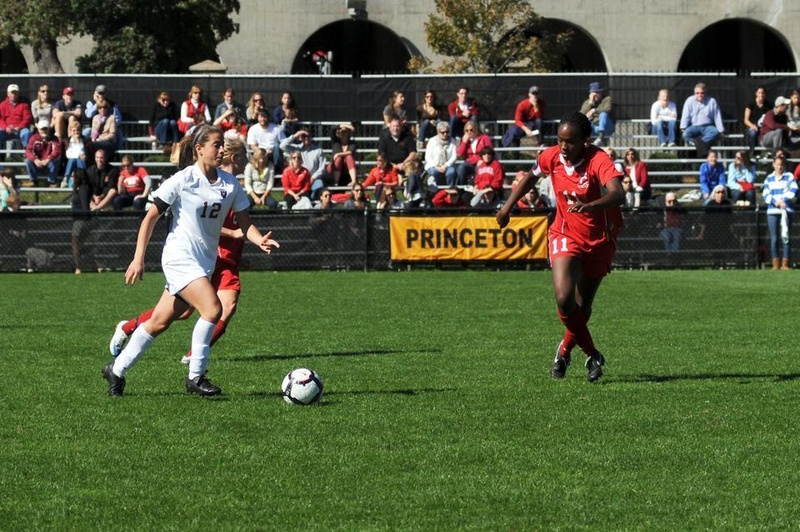
Sophomore Alexandra Conigliaro, shown here in earlier action, scored her second goal of the season to stake women’s soccer to a 1-0 lead early in Saturday’s game at Brown. But Harvard would give up two unanswered goals and drop the contest, hurting the team’s shot at a third straight Ivy crown.
The Harvard women’s soccer team entered the 2010 season with the goal of becoming just the second squad in program history to win three straight Ivy League championships.
That goal will likely go unrealized after the Crimson (5-5-1, 2-2 Ivy) dropped a 2-1 decision to Brown (7-4-3, 1-2-1) at Stevenson Field Saturday afternoon, picking up its second conference loss of the season.
The Bears, meanwhile, earned their first conference win of the year, relying on a late strike from freshman Louisa Pitney to take the 2-1 advantage—its first lead of the game—in the 84th minute.
“It was disappointing,” sophomore goalie AJ Millet said. “We came out strong but then kind of lost it. I feel like they kind of outplayed us.”
Harvard came up with two scoring opportunities late in the contest, but Brown managed to preserve its lead for the final six minutes of play, sending the Crimson home empty handed.
Harvard senior midfielder Kerry Kartsonis had the first of the Crimson’s final two chances, taking a shot in the 85th minute that was deflected by Bear goalkeeper M.C. Barrett. Co-captain Katherine Sheeleigh followed with a try of her own less than 30 seconds later, but her attempt was blocked.
“We kept fighting,” said Millet, who finished with four saves in her first game back since she suffered an injury four games into the season. “We definitely had some chances.”
But Harvard was unable to capitalize on those chances, resulting in its first loss since late September.
The way the game began, though, few could have predicted that the Crimson would finish on the losing end of the contest.
The visitors set the tone in the early going, taking the game’s first three shot attempts and eventually netting the first score.
Brown withstood Harvard’s initial attacks, as Bear starting keeper Amber Bledsoe rejected shots from Sheeleigh and sophomore Alexandra Conigliaro in the first 17 minutes of play.
But in the 28th minute, Conigliaro and Sheeleigh teamed up to get one past Bledsoe, connecting on a deep cross. Sheeleigh sent the pass to the far post, and Conigliaro finished with a one-time volley into the corner of the net, giving the Crimson the 1-0 lead.
“[Sheeleigh] just had this beautiful cross to the back post and [Conigliaro] was right there to finish it,” sophomore Taryn Kurcz said.
But momentum soon shifted to the home team after Brown answered with a score of its own just over 10 minutes later.
Brown Sophomore Diana Ohrt evened the score at 1-1 after she received a pass from Pitney off a corner kick and deflected the ball past Millet
“We didn’t mark up,” Kurcz said. “We just lost our marks.”
The Crimson hustled to regain the lead before the break but was whistled for going offside in the 39th minute and then had a shot blocked in the 45th minute.
The teams traded shot attempts throughout the second half, but Millet and Barrett—who replaced Bledsoe in goal for the Bears—kept their opponents off the scoreboard, making three saves apiece before the 80th minute.
Brown finally broke the deadlock in the 84th when Pitney headed a high cross into the cage past Millet.
The Bears managed to halt Harvard’s final attempts to send the game to overtime, preserving the 2-1 victory.
“We started off really well—fired up and ready to play,” Kurcz said. “Our problem this game was that we didn’t keep that intensity for the whole game, and Brown did. You can’t let down for one second or the other team’s going to capitalize on it.”
With the defeat, the Crimson drops to fourth place in the conference standings, trailing first-place Columbia by two games in the loss column with only three Ivy League games left to play.
“The biggest problem now is that we’re not in control of our own destiny,” Kurcz said. “What we have to do now is win out and hope for the best. It’s always a tough spot to have to rely on other people, but that’s we got ourselves into, and we’re going to make the most of it.”
—Staff writer Martin Kessler can be reached at martin.kessler@college.harvard.edu.
Read more in Sports
Harvard Takes Two Of Three on The Road












